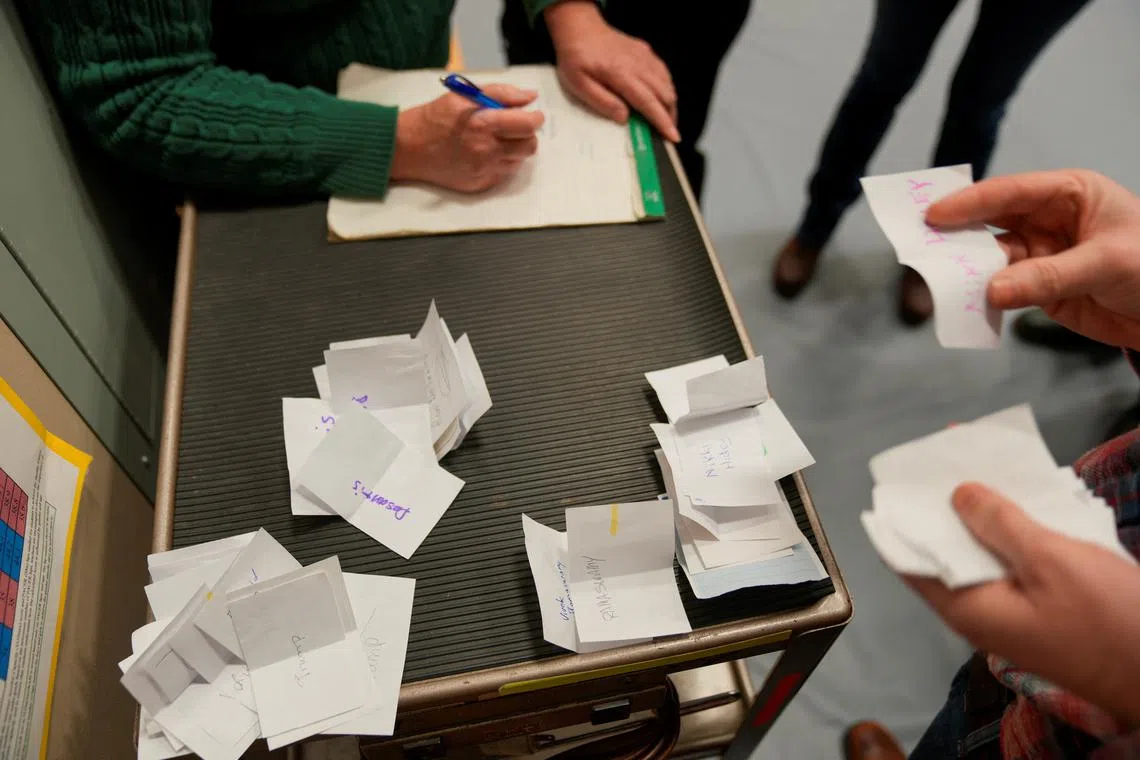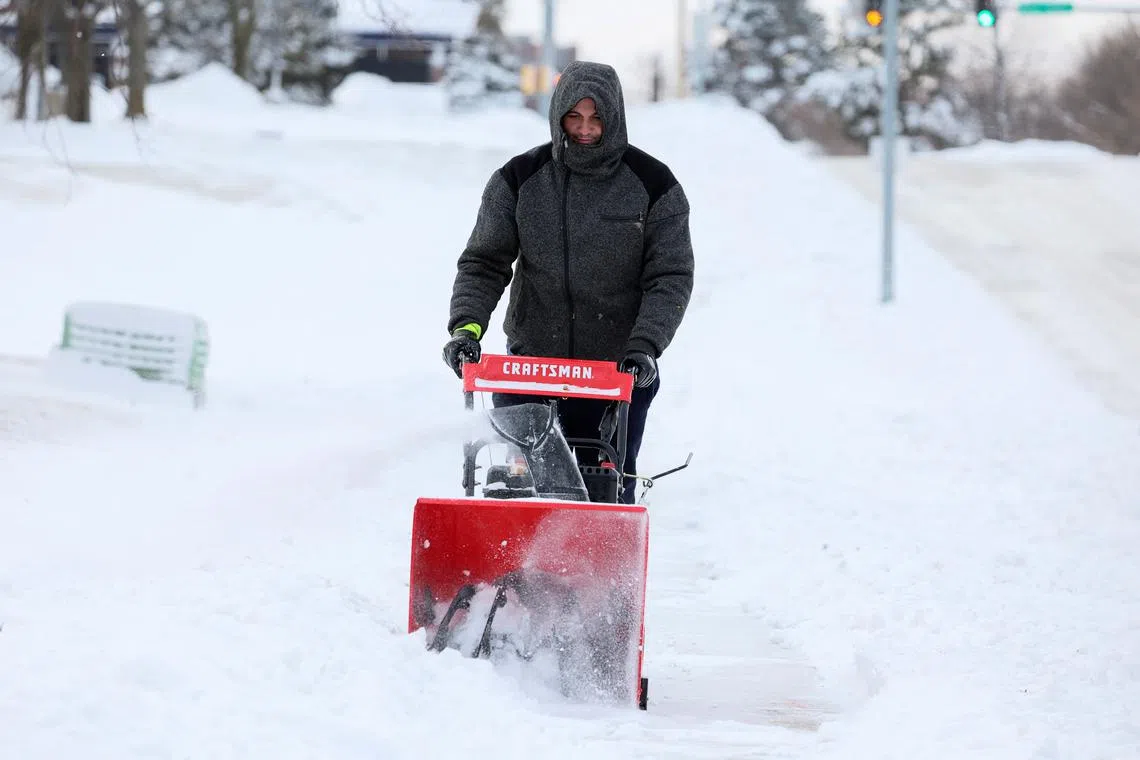Trump wins Iowa caucus, DeSantis edges Haley for second spot
Sign up now: Get ST's newsletters delivered to your inbox
Follow topic:
DES MOINES -Donald Trump secured a resounding victory in the first 2024 Republican presidential contest in Iowa on Jan 15.
The win once more asserts his dominance over the party as he seeks a third consecutive nomination and a rematch with Democratic President Joe Biden.
Florida Governor Ron DeSantis, 45, finished well behind in second place, Edison Research projected. He edged out former United Nations ambassador Nikki Haley, 51, as they battle to emerge as the chief alternative
Trump’s unprecedented margin in the contest despite facing four criminal indictments
“THANK YOU IOWA, I LOVE YOU ALL!!!” Trump wrote on his social media platform, Truth Social.
With at least 95 per cent of the expected vote tallied, Trump had 51 per cent, while Mr DeSantis was at 21 per cent and Ms Haley 19 per cent, according to Edison. The largest margin of victory for an Iowa Republican caucus had been 12.8 percentage points for Bob Dole in 1988.
Entrepreneur Vivek Ramaswamy ended his long-shot presidential bid
If Trump finishes above 50 per cent, winning more than all his rivals combined, it would further weaken his opponents’ argument that his march to the nomination can be derailed.
His performance reflected his popularity among Republican voters – even after two impeachments, his involvement in the Jan 6, 2021, attack on the United States Capitol by a mob of supporters, and his 91 criminal charges for trying to overturn the 2020 election, retaining classified documents after leaving the White House and falsifying records connected to hush money payments to a porn star.
Only one-third of caucus-goers said Trump would be unfit for president if convicted of a crime. Nearly two-thirds said they did not believe Mr Biden legitimately won the 2020 election, embracing Trump’s falsehoods about voter fraud.
Trump dominated across the board, according to an Edison entrance poll: He won a majority among men and women; among those who consider themselves very conservative, somewhat conservative and independent; among those who graduated from college, and those who did not.
He captured a majority of Republicans who put immigration as their top concern – and a majority of those who said the economy was their main worry.
“The Iowa caucus results demonstrate the strength of Trump’s grip on the Republican Party,” said Mr Jimmy Centers, an Iowa-based Republican strategist. “Absent a quick consolidation of the field, Trump appears to be on a fast track to the nomination.”
That consolidation appears unlikely, with both Mr DeSantis and Ms Haley vowing to press ahead following the results on Jan 15, ensuring Trump’s opposition will remain fractured as the campaign moves to other states.

Votes being counted during a caucus to choose a Republican presidential candidate, at Fellows Elementary School in Ames, Iowa, on Jan 15.
PHOTO: REUTERS
Mr DeSantis in particular had wagered his campaign on Iowa, barnstorming all of its 99 counties and pouring resources into the state.
“We’ve got our ticket punched out of Iowa!” Mr DeSantis told supporters in West Des Moines on Jan 15.
Ms Haley, who has enjoyed a steady rise in polls over the last few months, sought to position herself as the leading Trump challenger.
“At one point in this campaign there were 14 of us running. I was at 2 per cent in the polls,” Ms Haley told a crowd of supporters. “When you look at how we’re doing, in New Hampshire, in South Carolina and beyond, I can safely say tonight Iowa made this Republican primary a two-person race.”
Republicans in more moderate New Hampshire will choose their nominee eight days from now. Polls show Trump with a smaller lead over Ms Haley in that state, with Mr DeSantis far behind.
Trump has sought to create an air of inevitability around his campaign, skipping all five of the Republican debates thus far and largely eschewing the county-by-county campaigning most candidates do ahead of the Iowa vote.
Life-threatening cold
Iowans braved life-threatening temperatures at more than 1,600 schools, community centres and other sites for the state’s first-in-the-nation caucus, as the 2024 presidential campaign officially got under way after months of debates, rallies and advertisements.
“Trump is very narcissistic, he’s very cocky, but he’s going to get stuff done,” said Ms Rita Stone, 53, a Trump backer, who attended a caucus at a West Des Moines high school.
Like many other voters, Ms Stone said her top concern was the US southern border with Mexico, praising Trump’s effort to build a wall when he was president.
Unlike a regular election, Iowa’s caucus requires voters to gather in person in small groups, where they cast secret ballots after speeches from campaign representatives.

A maintenance worker removing snow from a sidewalk ahead of the Iowa state caucus vote, in West Des Moines, Iowa, on Jan 15.
PHOTO: REUTERS
Edison projected there would be approximately 120,000 votes counted, far short of the record 187,000 cast in the 2016 Republican caucus.
With the cold weather depressing turnout, Trump’s grip on his most loyal supporters may have given him an edge.
Iowa Democrats did not vote on Jan 15 for their presidential nominees because the party has reshuffled its nominating calendar to put states with more diverse populations ahead of Iowa in 2024. They will cast their ballots by mail, with the results to be released in March.
Iowa has historically played an outsized role in presidential campaigns due to its early spot on the campaign calendar.
But the winner of Iowa’s Republican caucuses did not go on to secure the nomination in the last three competitive contests in 2008, 2012 and 2016.
A political battleground that backed Democrat Barack Obama in 2008 and 2012, the state is now seen as reliably Republican in presidential elections as registered Republicans edge out Democrats. REUTERS

